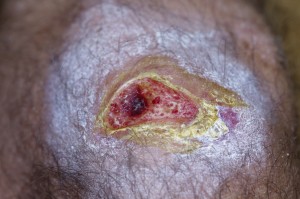Wound Infections: How To Identify And Treat
Wound Infections: How To Identify And Treat
 The human body is incredible at healing itself. Minor skin wounds generally heal without issue, but deeper cuts that require stitches are at a greater risk for infection.
The human body is incredible at healing itself. Minor skin wounds generally heal without issue, but deeper cuts that require stitches are at a greater risk for infection.
If you can’t stop a wound from bleeding or if the cut extends deeper than the top layer of skin you may need stitches. One of the main reasons stitches are required is to keep out infection. The sooner a deep cut is sutured, the lower the risk for infection.
Shallow cuts that don’t require stitches can still become infected if exposed to bacteria or other microorganisms. Infected wounds will not heal properly and can lead to worsening of the wound. Most wounds contain some bacteria but your body’s immune system is able to fight it off. If your immune system becomes overwhelmed or weakened the bacteria has a chance to flourish, resulting in an infected wound.
Signs And Symptoms Of A Wound Infection
The moment you notice your wound is infected you should seek urgent medical attention. Signs of a wound infection include:
- The wound is draining yellow or green-tinted fluids/pus
- The skin surrounding the wound is red, inflamed, warm to the touch, or painful
- Any sign of red streaks across the skin may indicate an infection of the lymph system, which is responsible for carrying fluid from the tissues.
- Fever
- You notice a foul smell coming from the wound
- You feel dizzy and have an increased heart rate
The High Risk For Infection Associated With Puncture Wounds
A puncture wound forms when something small and sharp pierces your skin. These wounds tend to appear small and may not bleed as much but they can still be very deep. When puncture wounds occur bacteria and debris are pressed deep into the wound, creating an ideal location for bacteria to thrive.
For instance, if you step on a nail and it penetrates deep into your foot you may experience an infection of the bone. This risk increases if the nail penetrates through a sneaker before entering your skin. This is because the foam in shoes can be loaded with bacteria known to cause serious tissue infections.
It is not easy to properly clean out a puncture wound, which is why it’s highly recommended to visit your local Urgent Medical Center if you have one.
How To Help Prevent Wound Infections
Most wounds will not become infected, although without proper precautions and good hygiene the risks greatly increase. In order to help prevent a wound from becoming infected there are a number of things you can do.
- Immediately clean out the area with soap and water
- Apply an antibiotic ointment, such as Bacitracin, Polysporin, or Neosporin.
- Cover the wound with a clean bandage to reduce the risk of bacteria and dirt getting inside. You need to change this bandage three times a day, or anytime the bandage becomes wet or dirty. When you do so always check for any sign of infection.
Risk Factors Associated With A Higher Rate Of Wound Infection
You are at a greater risk of developing a wound infection if:
- You have a preexisting disease or health condition such as diabetes, cancer, or any conditions related to the kidney, lung, or liver.
- A foreign object becomes partially lodged in the wound, such as glass or metal
- You have poor blood supply to the region impacted by the wound. Reasons that you may have decreased blood supply include: high blood pressure, blocked/narrowed blood vessels, if you smoke, or have had any previous blood vessel or heart-related issues.
- The same wound is repeatedly injured
- If you have a weakened immune system for any reason, such as poor nutrition, a preexisting condition, or if you are taking certain medications, or undergoing radiation treatment.
Do You Need A Tetanus Shot For A Bad Wound?
Most US residents have already been immunized for tetanus (lockjaw). If you have not had a tetanus shot in the last 10 years and the wound occurs in a very dirty location, or an area prone to tetanus, a booster is recommended within 5-years. If you have never been immunized against tetanus or did not complete the three shot immunization, you may need tetanus immunoglobulin, a certain medication used to prevent lockjaw.
Treatment For Infected Wounds
A quick trip to your local Urgent Medical Center will provide you with the care you need to start healing. A doctor will ask about your medical history as well as the cause of your injury. Blood tests may be necessary to pinpoint infection. X-rays, CT, or MRI scans are also used in some cases to identify if there are any broken bones, or foreign objects stuck in the skin. A wound culture test may also be used to identify the cause of infection.
Once the infection is identified a thorough wound cleaning will be applied. Antibiotics may be prescribed to help fight off infection and NSAIDs can help decrease pain, swelling, and any fever.

